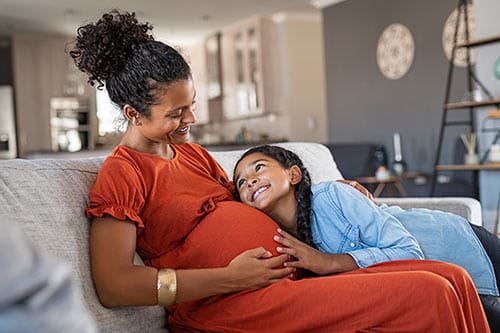
But not so fast: the reality is, you might not feel the same this pregnancy. Actually, there are a few ways that a second pregnancy differs from a first one physiologically. Find out what’s in store over the next few months, so you can avoid any surprises:
1. Some symptoms might be less noticeable. This time around, you might notice that common pregnancy woes like aversions to certain foods seem less severe. Plus, you might feel more relaxed and less worried, too, since you’ve already been there, done that, and lived to tell about it.
2. You’ll probably “feel” pregnant sooner. Most women who have already had a baby are already familiar with the early symptoms of pregnancy, so they’re more likely to recognize them. With that said, the symptoms might differ from the last time. For example, you might have more or less urinary frequency or more or less morning sickness.
3. You may “show” sooner. Since your first pregnancy stretched your abdominal and uterine muscles, they’ll inevitably be looser this time around. Since they won’t hold things in quite as tightly, your bump will likely show much sooner than it did the first time.
4. You might notice your baby moving sooner. During your first pregnancy, you might have dismissed those strange, fluttery, bubbly feelings were just gas. Now that you’ve experienced pregnancy, you know what to expect and will realize when your baby is moving. Around month 4 of this pregnancy, you’re more likely to be aware of your baby kicking (instead of month 5 for first-timers).
5. You might carry lower. Since your uterine muscles aren’t as firm as they once were, and baby number two is likely to be larger than your firstborn, you may carry lower this time. Carrying lower could potentially result in more back pain and other pregnancy aches.
6. Your labor might be shorter. There’s some good news about how long you might be in the delivery room. While the second phase of labor for a first-time mom can last two to three hours or longer, for second-timers, it may take half that much time.
Also, pushing your baby out tends to be quicker the second pregnancy around, too. Why? Your cervix is more flexible now, so dilation and effacement usually happen more quickly. Also, your cervix and vaginal tissue are more pliant the second time around, so they submit to the pressure of the baby’s head more easily. In other words, your baby is more apt to “pop right out!”
7. Breastfeeding might be easier. Since you’ve done this before, you now have a better idea of what to do. A surprising reason breastfeeding is easier is that your body is physically primed to lactate, according to this study. Changes in your mammary glands make them ready to deliver milk more quickly the second time.
